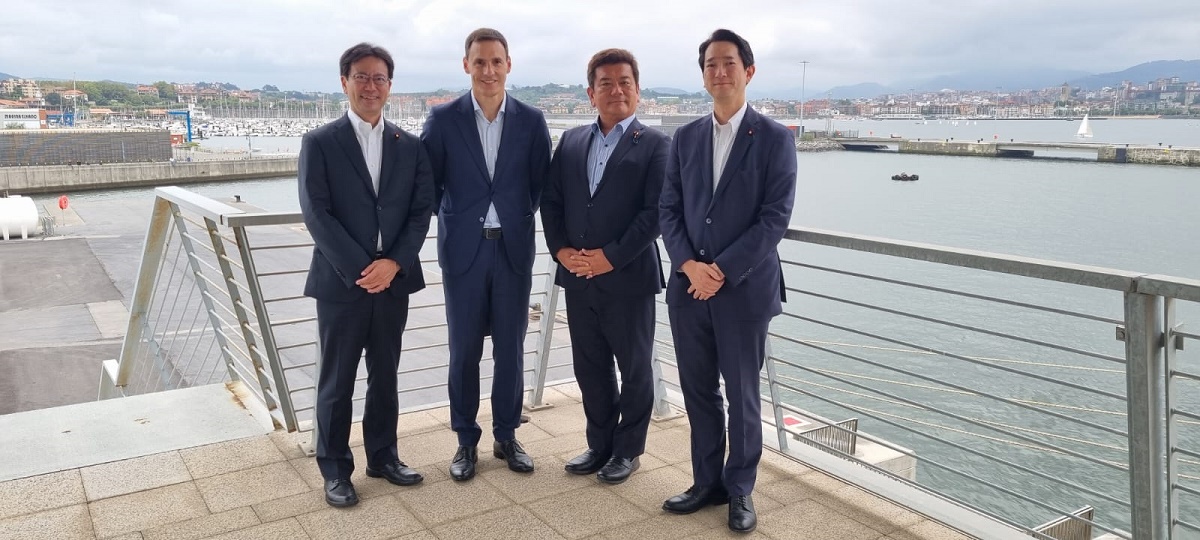A delegation from the Lower House of Japan, the legislative body of the Asian country, visited the facilities of the Port of Bilbao with a view to strengthening trade links between the two parties. The meeting, held at the Olatua cruise terminal of the Bilbao Port Authority in Getxo, was attended by members of the Japanese House of Representatives, such as Takashi Kii and Hiroyuki Moriyama, directors of the Committee on Territory, Infrastructures, Transport and Tourism, and Kiichiro Hatoyama, a member of the same Committee, accompanied by civil servants from the Secretariat of the House of Representatives.
The large Japanese delegation, which was received by Andima Ormaetxe, Director of Operations, Commerce and Logistics of the Bilbao Port Authority, also included Shinji Minami and Mai Sasaki, Minister (Second Head) and Counsellor at the Japanese Embassy in Spain, respectively.
The delegation was particularly interested in the actions being taken by the Port of Bilbao to reduce the carbon footprint of its logistics activity, such as the development of green and digital maritime corridors, the agreements with the ports of Amsterdam and Duisburg to establish a renewable hydrogen corridor between the Basque Country and the centre of Europe, and the BilbOPS project to equip the container, ferry, ro-pax, ro-ro and cruise terminals with OPS technology.
The BilbOPS project is co-funded by the Connecting Europe Facility (CEF Funds) and the Bilbao Port Authority itself. A loan of 80 million euros has also been secured from the European Investment Bank (EIB), part of which will also be used to finance this project. Once the OPS system is commissioned in 2027, vessels will be able to switch off their auxiliary engines during their stay in port and run on energy partly from renewable sources, such as PV panels, which will reduce greenhouse gas emissions and minimise noise and vibration levels, thus contributing to the energy transition and decarbonisation of maritime transport. The project envisages a reduction of 38.8% in CO2 emissions from the Port, and a total reduction of 9,062 tonnes of CO2 emissions.
Cruise tourism
Another of the aspects discussed at the meeting was the operation and management of maritime tourism. The Port of Bilbao is at the forefront in Europe for this type of traffic, and its specific facilities are one of the main attractions for shipping companies which are increasingly opting for Bilbao as a gateway to discover the tourist attractions of Bilbao, Bizkaia, the Basque Country and neighbouring regions. In 2024, the cruise terminals in Getxo welcomed more than 150,000 tourists, 283 of them Japanese, on board 90 cruise ships, figures that are expected to be exceeded in the 2025 season, in which 428 Japanese tourists have already arrived up to July.
The Port Authority is constantly working to offer a quality service to both passengers and shipping companies, improving accessibility for people and vehicles, adapting port infrastructure to the needs of the modern vessels that dock at its quays, and promoting efficient operations in which the comfort and safety of passengers are paramount at all times.
Traffic with Japan
The visit of the delegation from the Lower House of Japan coincides with the trade tensions caused by the tariff policy initiated by the US administration. Amongst other objectives, the visit aims to strengthen ties between the business and logistics fabric of Japan and the Basque Country and to open up new markets for companies.
In 2024, 10,219 tonnes of goods were exported from the Port of Bilbao to Japan, mainly in the category of ‘Other Goods’ (3,073 tonnes) and ‘Other Metallurgical Products’ (2,270 tonnes). In terms of imports, 157,774 tonnes were handled last year, mainly under the headings ‘Iron and Steel Products’ (148,540 tonnes) and ‘Other Goods’ (3,474 tonnes).

 Port access
Port access